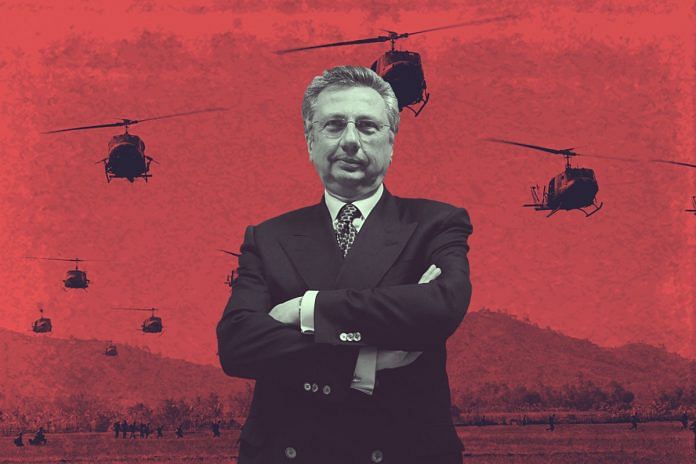The evidence shows middlemen and collusion, but connecting the dots has always been a weakness for Indian investigators. The case is far from over in India.
The acquittal of two top former AgustaWestland executives in an Italian court on charges of corrupting the Indian system to sell VVIP helicopters is the final call on the matter. For the Italian system, the case is finished – there is no option for appeal, and as far as it is concerned, investigators could not establish that money siphoned off from the company reached Indian public officials.
However, for India – a late and somewhat reluctant entrant into investigations that originated in Italy – the case is far from over. Investigators have a tough, long battle ahead. The Italian acquittal will have little, if any, bearing as the case goes through the Indian legal process.
Connecting the dots has always been a weakness for Indian investigators – especially in a case like this that involves money travelling through four nations, and fixers or key suspects spread out between Dubai, Italy and Switzerland. But, with the CBI pulling up its socks – a new government at the Centre may have a bit to do with that – there are indications that the Indian side may have a much stronger case on its hands.
Separate legal process
To recap – Italian investigators started a probe in late 2011 on AgustaWestland for wide-ranging international corruption. One of the deals under question was India’s purchase of a new fleet of VVIP helicopters for 556 million euros.
An elaborate investigation that went into 2012 involved phone interceptions, wire taps in the offices and even luxury cars of the suspects, and a final round of raids in which several thousand documents and financial records were seized.
The assumption was that the company paid two sets of middlemen 56 million euros to influence Indian authorities to knock off the competition in favour of AgustaWestland. Investigations into the case ended in 2013, when the matter went to trial court.
The trial court in Italy dropped the corruption charges, but a higher court held the executives guilty. In between, AgustaWestland itself managed to exit the case, pleading that the actions of its executives did not make it liable for criminal action. The company paid a fine and promised to institutionalise reforms for better oversight; the result being the renaming and restructuring of its parent company Finmeccanica as Leonardo.
Contract cancellation
Indian investigations into the case started in 2013 – a process completely independent of the Italian case to begin with. While most of the initial evidence gathered was from Italian investigators, the Enforcement Directorate in particular managed to dig much further into the deep financial web that was used to pull money from Italy to India via a circuitous route that went from Tunisia to Mauritius and Singapore.
The defence ministry itself carried out an internal probe in 2013, and decided that enough evidence existed that the Italian company had flouted norms by hiring middlemen or fixers in India. Unlike the Bofors case – which did not see penal action against the Swedish company – the 556 million euro contract was cancelled, and India managed to recover almost all of the money it had paid the Italian company. The four AW-101 choppers that were delivered have been mothballed and parked at the Palam air base while an arbitration process with the Italian company continues.
For the Indian system, the VVIP chopper deal is officially crooked – cancellation of the contract on 1 January 2014 was on the basis of proof that the company flouted norms. The cancellation was done by the same government – Manmohan Singh’s UPA – that was in power when the deal was signed, a candid admission of guilt.
Connecting the dots
Now what remains to be done, from the Indian context, is to assign blame and responsibility for the deal going crooked. This is where the CBI and ED investigations come into the picture.
There are indications that a part of the money trail has been established by investigators, which tracks money travelling to India through a chain of companies – a large part of it via Singapore.
What makes it particularly difficult to track money is the old Indian trick – using cash through an informal international trading system. However, a smaller but quantifiable sum of money has been traced as reaching India through the formal financial system as well.
The case at hand has the following elements – the Italian company did hire consultants for dealings in India, money did leave the Italian company for purposes that cannot be fully explained, and the contract was cancelled in India after the government decided that trials and specifications were fixed in favour of a particular company.
The question is: Will Indian investigators be able to connect the dots and move on prosecution? For its dismal record in investigating arms deals, the AgustaWestland case is possibly the strongest that the CBI has ever had.



